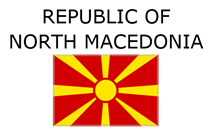The table below aims at gathering the administrative and governmental bodies of the Republic of North Macedonia, which are responsible for digital public administration policies and interoperability policies.

National
The Ministry of Information Society and Administration (MISA) is responsible for all issues pertaining to IT, including the policy and strategy for eGovernment and the modernisation of the Macedonian public administration. In this context, the Ministry publishes reports and strategies, and is in charge of drafting and implementing eGovernment-related international agreements and policies.
In September 2020, Mr Jeton Shaqiri was appointed as the new Minister of Information Society and Administration, replacing Mr Damjan Mancevski.
Government ministries and State bodies at national and local level are responsible for the implementation of sectorial ICT and eGovernment projects.
The National ICT Council was established in February 2018 to prepare and monitor the implementation of the National ICT Strategy, as well as to provide guidance on annual public procurement plans, and technical specifications applying to the tender documentation for public sector institutions and the procurement of ICT equipment and/or software. The National ICT Council consists of the relevant ministers, thereby ensuring the coherence of strategic-level decisions across State institutions.
The National ICT Council is supported by an Operational Body for Expert and Operational-Logistical Support, with the following responsibilities:
- assist in the preparation of requests, strategic documents and proposals;
- prepare reports with proposals for further action;
- review good practices and propose measures to improve the situation;
- cooperate with other operational working bodies and ICT groups;
- participate, if necessary, in the sessions of the Council and other ICT support bodies;
- review strategic documents and projects related to ICT; and
- review and give opinions, suggestions and advice on other matters, at the request of the Council, related to the scope of work of the Council.
The National Cybersecurity Strategy and Action Plan envisaged the establishment of a high-level body for defining new strategic directions and recommendations related to the cybersecurity segment, as well as for coordinating and monitoring the activities defined in the strategy and the accompanying action plan. At the end of 2019, the GRNM established the National Cybersecurity Council, consisting of the Ministers of Defence (MoD), Interior (MoI), and Information Society and Administration.
The establishment of this body and its competencies are provided for by the new draft Law on the Security of Network and Information Systems, which is expected to be adopted by the end of 2021. Until then, these activities will be conducted by an inter-ministerial working group consisting of representatives from the MISA, the MoD and the MoI, and other relevant stakeholders.
The National Operational Broadband Plan envisaged the establishment of a national Broadband Competence Office (BCO) in the Republic of North Macedonia. The BCO was established in 2019 as an expert body supporting the investments in broadband infrastructure (especially in rural areas) by increasing their efficiency.
The Digital Forum for Information and Communication Technologies was established in June 2018 (Official Gazette No. 107/2018) as an expert and advisory body in the field of information society. The Digital Forum provides for the coordination and participation of the public, private, civil society and academic communities in the development of the information society.
During 2020, one of the anti-COVID measures that the GRNM adopted was the granting of vouchers to young people for taking ICT-related courses. In this context, the Digital Forum was responsible for approving the private educational entities that applied for delivering ICT training. The whole process was performed electronically through the National eServices Portal, for both applicants and the Digital Forum.
The Assembly of the Republic of North Macedonia held a parliamentary procedure on 25 December 2019 and elected the new Agency’s management, i.e. Ms Plamenka Bojceva as Director of the Agency and Mr Blerim Iseni as Deputy Director of the Agency, which transformed the Commission for the Protection of the Right to Free Access to Public Information into an Agency for the Protection of the Right to Free Access to Public Information.
Consequently, as of the end of December 2019, the Agency for the Protection of the Right to Free Access to Public Information, as a legal successor to the Commission for the Protection of the Right to Free Access to Public Information, has fulfilled the legally prescribed conditions of operation and decision-making.
The State Audit Office (SAO) is an independent supreme audit institution in the Republic of North Macedonia, which transparently, timely and objectively informs the public about the findings from the audits which it has been conducting for more than 20 years.
As an independent external auditor, SAO is conducting audit in accordance with the auditing standards of the International Organisation of Supreme Audit Institutions (INTOSAI), by applying high professional qualifications and continuous training of employees, who are the core value in its work.
The independence of the institution is determined by the State Audit Law, which regulates SAO competencies and its broad mandate for conducting regularity and performance audits, with unlimited access to all necessary information, documentation and records. SAO independently defines the annual work programme and decides on the topics and the entities to be subject to audit, as well as on the audit method and the contents of the reports on performed audits, without bias and free from external influences. In the last years, SAO has also been conducting IT audits as performance audits.
Starting from December 2019, SAO has been directly informing 160 stakeholders about the publication of audit reports. In addition, SAO introduced the audit report abstract, which contains the most important information of the report in an easy‑to‑read form, so as to facilitate understanding of the contents of audit reports. When a new final audit report is published, the media, news agencies, individual research journalists and civil society organisations are immediately informed with a link to the published report on the SAO website and an abstract from the report.
According to the new Law on Personal Data Protection, the Personal Data Protection Agency is an independent and autonomous State administration body responsible for monitoring the lawfulness of activities carried out when processing personal data on the territory of the Republic of North Macedonia, as well as for protecting the fundamental rights and freedoms of natural persons in relation to the processing of their personal data.
The Association of Local Government Units (ZELS) is a non-profit organisation and unique national association, including, on a voluntary basis, all 80 municipalities, with the City of Skopje as a separate unit of local self‑government. The Association was founded on 26 April 1972. The president of ZELS is a member of the National ICT Council.
ZELS’ unit supporting eServices for municipalities, called ZUSE, is an administrative unit that enables implementation of priority eServices at local level. It provides one central support for all municipalities regarding maintenance of eServices and ICT infrastructure for several State information systems that are being used by the municipalities.
In coordination with several government ministries, the Association of Local Government Units (ZELS) is responsible for the implementation of part of the Law on Construction Land, the Law on Building Permits and the Law on the Use and Management of the State/Local Inventory, providing the tools needed for implementation.

